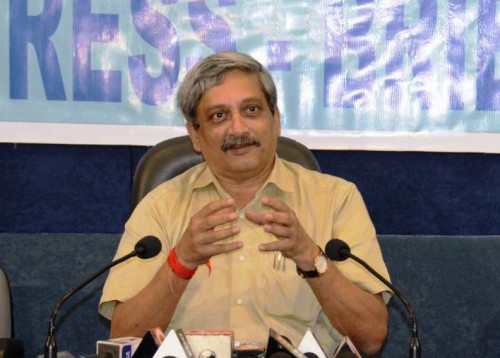
By Mayabhushan Nagvenkar
Repeated incursion by the Chinese troops into Indian territory have elicited divergent, at times almost contradictory, opinions from key cabinet ministers.
Home Minister Rajnath Singh, addressing a rally in Leh in poll-bound Jammu and Kashmir , said the breach of the border did not augur well for cordial relations between the Asian giants.
“China has illegally occupied Aksai Chin and incursion by Chinese troops do not augur well in maintaining cordial relations with our neighbour,” he said.
The minister added that New Delhi’s efforts to maintain good relations should see reciprocation from Beijing.
The home minister’s tough stance is in contrast to Defence Minister Manohar Parrikar’s more seemingly laidback and “soft” response to queries on Chinese intrusions.
Speaking at his first official media briefing Nov 12 after being appointed to his post, he said: “There are small small breaches of what you call as Line of (Actual) Control, that is not to be taken too seriously.
“Overall the problem is being tackled in a different way. I’ll not discuss about individual crossings,” he added.
He, however, said it would be considered a serious issue if Chinese troops actually set up camps on Indian territory.
Parrikar, while saying the intrusions were a “serious issue” only for the media, also stated that it was usual for Chinese soldiers to enter Indian territory and Indian soldiers to stray on to Chinese soil often.
“It is a natural phenomenon as troops from both the sides usually trespass into each other’s territory by mistake as there is no definite demarcation of the border,” he said.
Both Parrikar and Rajnath Singh are members of the key Cabinet Committee on Security which also includes Prime Minister Narendra Modi and deals with, among other things, issues related to sensitive defence and security matters.
The sense of bonhomie created by Chinese President Xi Jinping’s trip to India in September was marred significantly with escalating tension on the India-China border – and a sudden surge in the number of intrusions into Indian territory by the People’s Liberation Army.
India and China fought a bitter border war in 1962.
China claims Arunachal Pradesh as a part of southern Tibet and disputes the McMohan Line drawn by the British.
China says that the border dispute is confined to 2,000 km of area, mostly in Arunachal Pradesh.
India says the dispute also covers the western side of the border spanning to about 4,000 km.
The two countries have held several rounds of talks by their special representatives to resolve the boundary dispute.
While China has blamed the border dispute on Western colonial legacy, efforts made by both countries to resolve the issue for years has not led to a permanent settlement.